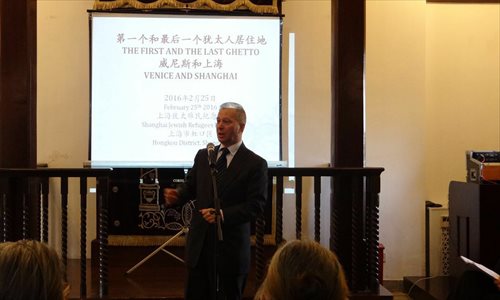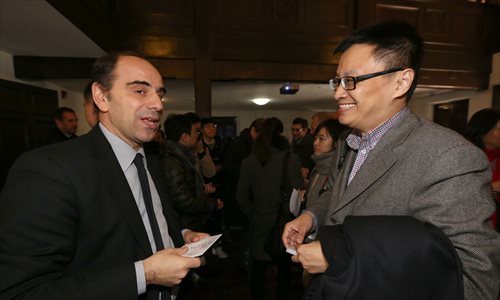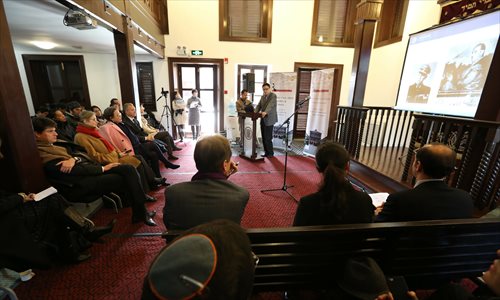HOME >> METRO SHANGHAI
500th anniversary of the Venice Ghetto celebrated at the Shanghai Jewish Refugees Museum
By Liao Fangzhou Source:Global Times Published: 2016-2-29 18:18:01
Today the word Ghetto indicates a city's isolated or segregated area, especially a slum, but 500 years ago it referred to a specific water-surrounded square in Venice inhabited by Jews.
For the 500th anniversary of the Venice Ghetto, the Consulate General of Italy in Shanghai hosted a conference at the Shanghai Jewish Refugees Museum, site of the world's last-constructed Jewish ghetto.
"The first and the last ghetto: Venice and Shanghai" put the legacy of both places into relation. Shaul Bassi, a professor from Ca'Foscari University of Venice, and professor Wang Jian of the Shanghai Academy of Social Sciences, respectively presented the historical and cultural heritage of these Jewish settlements.
"Those of us who have worked on this anniversary believe that the Ghetto has precious ethical and cultural lessons to educate the public about Jews as well as the broader question of cross-cultural dialogue, cooperation, and coexistence," Bassi said.
Stefano Beltrame, Consul General of Italy in Shanghai, said the event took a year to prepare and would be the beginning of a series of memorial events in the city. He was joined by diplomats from Israel, Austria, Germany, France, the Netherlands, Poland, Portugal and Sweden, along with local officials from Hongkou district.
Wang Jian gave a lecture on the ghetto in Shanghai, which was home to nearly 30,000 Jewish refugees from 1933 to 1941. He introduced the origins of the Jews who arrived here as well as how they opened businesses and immersed themselves in local life.
Art influence
Friedrich Schiff (1908-1968), an Austrian Jew, became one of the most famous comics in Shanghai with his humorous yet poignant illustrations of daily life.
Film director Jacob Fleck (1881-1953) and his wife Luise Fleck, who immigrated from Austria in 1939, shot Sons and Daughters of the World with Chinese director Fei Mu. It was the first-ever collaboration between Chinese and foreign film artists.
Wang pointed out that the Jewish refugees have made great contributions to Shanghai's cultural scene: more than half of the musicians with the Orchestra of Shanghai Municipal Committee in the International Settlements were Jews, and some taught Chinese students who later became the first generation of professional violinists in the People's Republic of China.
Bassi, who is an Italian of Jewish ancestry, offered a detailed overview of the Venice Ghetto's history in four phases: the age of the ghetto (1516-1797), emancipation (1797-1938), persecution (1938-1945, during which his own father was expelled from school), and memory (1945-2016).
He stressed that the Venice Ghetto was in fact an "incredibly diverse mosaic" of different Jewish traditions, with Italians, German Ashkenazim, Sephardim and descendants of Iberian Marranos coming together in the same small site, each speaking their own language and building their own synagogues.
He called it a "vivacious social and cultural melting pot" which created a mini-civilization that published one-third of all Hebrew books printed in Europe.
Venice Ghetto is visited by tens of thousands of people every year, yet Bassi believes it remains "the most misunderstood monument" in the city, partly because most people see it in the light of other Ghettos, especially those created by Nazis in World War II.
Thus, he sees the 500th anniversary of the founding of the Ghetto a unique opportunity to start a new phase in the history of the site and to highlight its global relevance.
A site of dialogue
"It is imperative to continue to commemorate the tragedies that occurred here, but it is also important to highlight the lessons of survival, creativity and cross-cultural dialogue that the Ghetto experienced," he said.
He added that anti-Semitism and racism continue to be urgent social and political factors in the world today. "We bear in mind that today several other ghettos exist both as physical enclosures and as metaphorical confinements, where minorities and under-represented groups are oppressed," said Bassi.
By reclaiming the Ghetto of Venice as a cosmopolitan center of cross-cultural creativity and dialogue, Bassi concluded that we can dream of a world where different civilizations can live together, cherishing their own identity.
The conference is part of a program of high-profile activities promoted worldwide by the Committee for the "500 years of the Jewish Ghetto of Venice" to honor this historical anniversary, including an opening ceremony and concert at La Fenice Opera House and an exhibition at the Doge's Palace in Venice.



Newspaper headline: Precious lessons
For the 500th anniversary of the Venice Ghetto, the Consulate General of Italy in Shanghai hosted a conference at the Shanghai Jewish Refugees Museum, site of the world's last-constructed Jewish ghetto.
"The first and the last ghetto: Venice and Shanghai" put the legacy of both places into relation. Shaul Bassi, a professor from Ca'Foscari University of Venice, and professor Wang Jian of the Shanghai Academy of Social Sciences, respectively presented the historical and cultural heritage of these Jewish settlements.
"Those of us who have worked on this anniversary believe that the Ghetto has precious ethical and cultural lessons to educate the public about Jews as well as the broader question of cross-cultural dialogue, cooperation, and coexistence," Bassi said.
Stefano Beltrame, Consul General of Italy in Shanghai, said the event took a year to prepare and would be the beginning of a series of memorial events in the city. He was joined by diplomats from Israel, Austria, Germany, France, the Netherlands, Poland, Portugal and Sweden, along with local officials from Hongkou district.
Wang Jian gave a lecture on the ghetto in Shanghai, which was home to nearly 30,000 Jewish refugees from 1933 to 1941. He introduced the origins of the Jews who arrived here as well as how they opened businesses and immersed themselves in local life.
Art influence
Friedrich Schiff (1908-1968), an Austrian Jew, became one of the most famous comics in Shanghai with his humorous yet poignant illustrations of daily life.
Film director Jacob Fleck (1881-1953) and his wife Luise Fleck, who immigrated from Austria in 1939, shot Sons and Daughters of the World with Chinese director Fei Mu. It was the first-ever collaboration between Chinese and foreign film artists.
Wang pointed out that the Jewish refugees have made great contributions to Shanghai's cultural scene: more than half of the musicians with the Orchestra of Shanghai Municipal Committee in the International Settlements were Jews, and some taught Chinese students who later became the first generation of professional violinists in the People's Republic of China.
Bassi, who is an Italian of Jewish ancestry, offered a detailed overview of the Venice Ghetto's history in four phases: the age of the ghetto (1516-1797), emancipation (1797-1938), persecution (1938-1945, during which his own father was expelled from school), and memory (1945-2016).
He stressed that the Venice Ghetto was in fact an "incredibly diverse mosaic" of different Jewish traditions, with Italians, German Ashkenazim, Sephardim and descendants of Iberian Marranos coming together in the same small site, each speaking their own language and building their own synagogues.
He called it a "vivacious social and cultural melting pot" which created a mini-civilization that published one-third of all Hebrew books printed in Europe.
Venice Ghetto is visited by tens of thousands of people every year, yet Bassi believes it remains "the most misunderstood monument" in the city, partly because most people see it in the light of other Ghettos, especially those created by Nazis in World War II.
Thus, he sees the 500th anniversary of the founding of the Ghetto a unique opportunity to start a new phase in the history of the site and to highlight its global relevance.
A site of dialogue
"It is imperative to continue to commemorate the tragedies that occurred here, but it is also important to highlight the lessons of survival, creativity and cross-cultural dialogue that the Ghetto experienced," he said.
He added that anti-Semitism and racism continue to be urgent social and political factors in the world today. "We bear in mind that today several other ghettos exist both as physical enclosures and as metaphorical confinements, where minorities and under-represented groups are oppressed," said Bassi.
By reclaiming the Ghetto of Venice as a cosmopolitan center of cross-cultural creativity and dialogue, Bassi concluded that we can dream of a world where different civilizations can live together, cherishing their own identity.
The conference is part of a program of high-profile activities promoted worldwide by the Committee for the "500 years of the Jewish Ghetto of Venice" to honor this historical anniversary, including an opening ceremony and concert at La Fenice Opera House and an exhibition at the Doge's Palace in Venice.

Consul General Stefano Beltrame

Professors Bassi (left) and Wang Jian

A seminar about the ghetto in Venice and Shanghai is held recently.
Photos: CFP and courtesy of the Italian consulate
Newspaper headline: Precious lessons
Posted in: Metro Shanghai